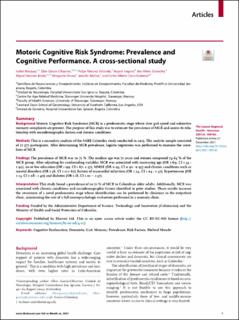| dc.contributor.author | Márquez, Isabel | |
| dc.contributor.author | Garcia-Cifuentes, Elkin | |
| dc.contributor.author | Velandia, Felipe Ramirez | |
| dc.contributor.author | Iragorri, Angela | |
| dc.contributor.author | Saavedra, Ana Maria | |
| dc.contributor.author | Borda, Miguel Germán | |
| dc.contributor.author | Osuna, Margarita | |
| dc.contributor.author | Ailshire, Jennifer | |
| dc.contributor.author | Cano-Gutierrez, Carlos Alberto | |
| dc.date.accessioned | 2022-02-17T13:33:03Z | |
| dc.date.available | 2022-02-17T13:33:03Z | |
| dc.date.created | 2022-02-01T11:58:00Z | |
| dc.date.issued | 2021-12 | |
| dc.identifier.citation | Marquez, I., Garcia-Cifuentes, E., Velandia, F.R., Iragorri, A., Saavedra, A.M., Borda, M.B., Osuna, M., Ailshire, J., Cano-Gutierrez, C.A. (2021) The Lancet Regional Health - Americas, 8, 100162. | en_US |
| dc.identifier.issn | 2666-7762 | |
| dc.identifier.uri | https://hdl.handle.net/11250/2979729 | |
| dc.description.abstract | Background
Motoric Cognitive Risk Syndrome (MCR) is a predementia stage where slow gait speed and subjective memory complaints are present. The purpose of this study was to estimate the prevalence of MCR and assess its relationship with sociodemographic factors and chronic conditions.
Methods
This is a secondary analysis of the SABE Colombia study conducted in 2015. The analytic sample consisted of 17·577 participants. After determining MCR prevalence, logistic regression was performed to examine the correlates of MCR.
Findings
The prevalence of MCR was 10·71 %. The median age was 71 years and women composed 74·63 % of the MCR group. After adjusting for confounding variables MCR was associated with increasing age (OR 1·69, CI 1·43 - 1·92), no or low education (OR 1·99, CI 1·67- 2·37), MMSE (OR 0·93, CI 0·91 - 0·95) and chronic conditions such as mental disorders (OR 1·36, CI 1·11-1·67), history of myocardial infarction (OR 1·24, CI 1·04 - 1·47), hypertension (OR 1·23, CI 1·08 - 1·40) and diabetes (OR 1.18, CI 1.01 – 1.37).
Interpretation
This study found a prevalence of 10·71 % of MCR in Colombian older adults. Additionally, MCR was associated with chronic conditions and sociodemographic factors identified in prior studies. These results increase the awareness of a novel predementia stage whose identification can be performed by clinicians in the outpatient clinic, minimizing the cost of a full neuropsychologic evaluation performed in a memory clinic. | en_US |
| dc.language.iso | eng | en_US |
| dc.publisher | Elsevier Ltd. | en_US |
| dc.rights | Attribution-NonCommercial-NoDerivatives 4.0 Internasjonal | * |
| dc.rights.uri | http://creativecommons.org/licenses/by-nc-nd/4.0/deed.no | * |
| dc.subject | nevrologi | en_US |
| dc.title | Motoric Cognitive Risk Syndrome: Prevalence and Cognitive Performance. A cross-sectional study | en_US |
| dc.type | Peer reviewed | en_US |
| dc.type | Journal article | en_US |
| dc.description.version | publishedVersion | en_US |
| dc.subject.nsi | VDP::Medisinske Fag: 700::Klinisk medisinske fag: 750::Nevrologi: 752 | en_US |
| dc.source.pagenumber | 10 | en_US |
| dc.source.volume | 8 | en_US |
| dc.source.journal | The Lancet Regional Health - Americas | en_US |
| dc.identifier.doi | 10.1016/j.lana.2021.100162 | |
| dc.identifier.cristin | 1996217 | |
| dc.source.articlenumber | 100162 | en_US |
| cristin.ispublished | true | |
| cristin.fulltext | original | |
| cristin.qualitycode | 1 | |

